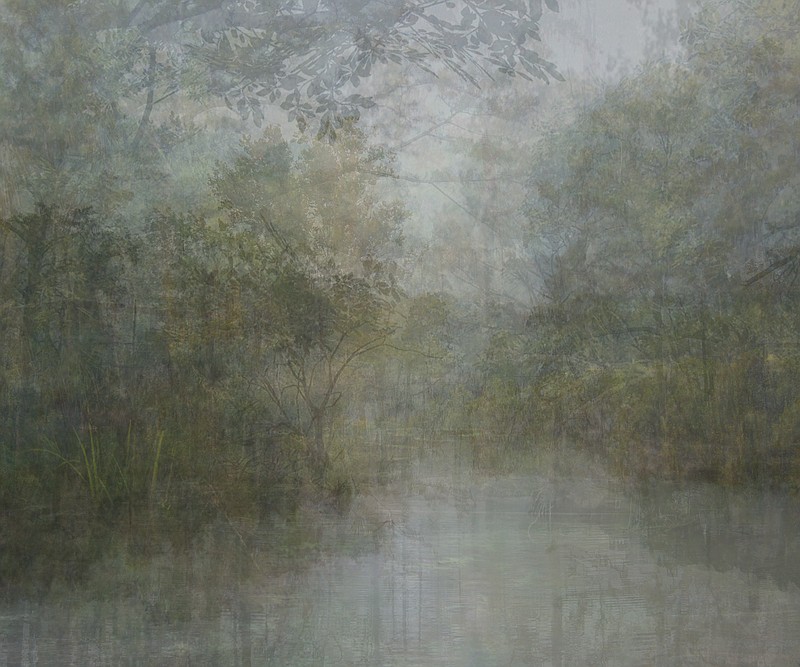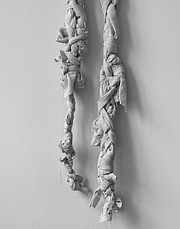If you go
› What: Diane Marek Visiting Artist Series featuring Amy Elkins› When: Daily through March 23› Where: Cress Gallery, University of Tennessee at Chattanooga, 752 Vine St.› Hours: 9:30 a.m.-7:30 p.m., Monday-Friday; 1-4 p.m., Saturday-Sunday› Admission: Free› Phone: 423-425-4600› Artist website: amyelkins.com› Gallery website: cressgallery.org
The title of Los Angeles-based artist Amy Elkins' "Black is the Day, Black is the Night" is a pretty forthright description of its emotional timbre.
The multimedia exhibit is comprised of real and composite images, drawings, letters and other memorabilia based on the photographer's five-year correspondence with inmates serving out lifetime or death row sentences in complete isolation. Of the seven men with whom she corresponded between 2009 and 2014, two have been executed and two were released.
Through her own research and their written exchanges, Elkins says her eyes were opened, not just to the inner workings of the American penal system and its application of capital punishment, but also to how inmates' perceptions of reality and their personalities were altered by their confinement. "Black is the Day, Black is the Night" is an attempt to depict the transformative nature of incarceration for men she only knew through their words and mugshots.
"I really became intrigued about this aspect of being completely removed from society but also just waiting slowly for your death," she says. "It's basically like a long-distance portrait that's constructed in the only way I was able.
"With each person, it was a painstaking amount of researching I had to do to create as much of a complete picture as I could. Even in that, I'm falling short because I can never really make a complete, realistic view of their lives."
In many cases, "Black is the Day, Black is the Night" display portraits of the inmates or composite photographs of places they remembered that have been artificially degrading using an algorithm based on the inmates' period of incarceration to reflect their fraying grip on reality.
Elkins is the latest featured artist in the University of Tennessee at Chattanooga's Diane Marek Visiting Artist Series. Through March 23, "Black is the Day, Black is the Night" will be on display at the Cress Gallery. It is exhibited alongside another one of Elkins' projects, "Parting Words," a "visual archive" of more than 500 inmates who have been executed in Texas in the 40 years since the state's death penalty was reinstated. Instead of photographs, their mugshots are rendered using excerpts of their last written statements.
Elkins' work has been featured by numerous outlets, including Wired magazine and Huffington Post. In 2014, "Parting Words" was the recipient of the prestigious international Aperture Portfolio Prize, which "identif[ies] trends in contemporary photography and highlight[s] artists whose work deserves greater recognition."
A self-described obsessive, Elkins says she tends to deep-dive into whatever subject her artwork is centered upon. In the case of "Black is the Day" and "Parting Words," that occasionally meant experiencing moments of empathy that left her feeling "kind of hopeless or helpless," but she says she's pleased that the completed exhibits invite a discussion of topics many consider to be taboo.
"It was an enriching experience," Elkins says. "It just really opened up my sense of awareness about my own surroundings, my relationships with others, my own sense of freedom and how much a lot of us take for granted. It made me feel more appreciative for my life.
"I just really like this idea that you're presenting information from a very personal space and letting people have the room to have their own thoughts about the subject. Most people I know don't talk about these subjects on their own. But if you bring it up, it creates a strong, varying, emotional reaction from people."
Contact Casey Phillips at cphillips@timesfreepress.com or 423-757-6205. Follow him on Twitter at @PhillipsCTFP.

